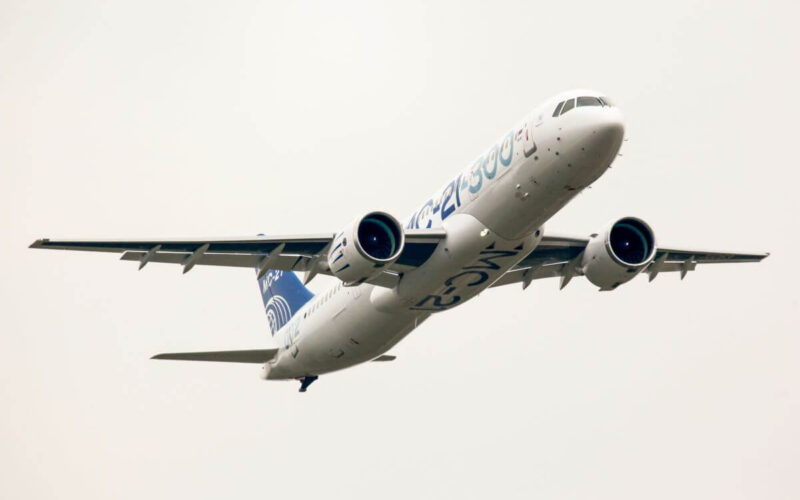The Russian narrow-body airliner Irkut MC-21, boldly advertised by the manufacturer to have a greater economic efficiency than Airbus and Boeing commercial jets, has another barrier on its way to mass production, previously expected in 2020. The main specificity of MC-21 − a prolonged wing, called the “black wing”, turns out to have American composites that are now unlikely to arrive due to the imposed US sanctions.
On December 10, 2018, Russian media Kommersant reported that US sanctions halted the supplies of Russian twinjet Irkut MC-21 composite materials. With reference to anonymous source, Kommersant wrote that after Washington imposed sanctions on Russian company Aerocomposit (which is a part of United Aircraft Corporation, UAC), delivery of parts coming from American Hexcel and Japanese Toray Industries was abandoned.
According to the source, the composite wing supply cut off would affect aircraft entrance to market date, delaying it for up to five years. “Now there is an option to use either Chinese composites, that are twice thicker and heavier, or wait for Russian enterprises to create something similar”, Kommersant source suggested.
Other international suppliers or domestic composites?
The state-owned conglomerate Rostec, in a comment to AeroTime, called the problem “strained”, saying there are other reliable suppliers of composite material, and American supply cancellations do not threat the MC-21 project.
Apart from other international suppliers, there are also ongoing domestic developments, as stated in the message. “First aircraft deliveries are planned for 2020 − and this date remains operative”, Rostec press-service stated. However, it remained unclear which exact measures are going to be taken to resume the manufacturing and finish certification by the middle of 2020.
Later on January 10, 2018, in an official press-release, UAC President Jury Slyusar announced that the replacement of MC-21 American and Japanese composite parts with indigenous analogues has already started. “Since 2014, the aviation industry has been working with Rosatom, All-Russian Scientific Research Institute of Aviation Materials, Moscow State University, and a number of private companies to create manufacturing technology for composite structures made of domestic materials,” Slyusar declared.
At the same time, according to the statement, American decision to abandon work with Aerocomposit was quite unexpected for the company, and an official complaint from the Russian side was filed.
The problematic “black wing”
MC-21 wing production has been quite challenging so far. In 2016, the Irkut Corporation received first part of the composite wing, produced by Aerocomposit using innovative technique of vacuum infusion and automated laying of carbon filler.
The basic technology for the wing wasn’t developed in Russia though. Some experts say it is produced using western technologies, as well as imported carbon fibers and polymeric binders. What was claimed to be the main innovation of the aircraft, became practically difficult to produce. In 2017, after the aircraft first test flight, it turned out that the wing required further modifications. Thus, the launch was postponed first till 2018, and then – till 2019.
Three aircraft in total had been manufactured by 2019 and all of them are being tested now. The residuary composite materials from American and Japanese suppliers would be enough for six more liners, according to sources cited by Kommersant.

